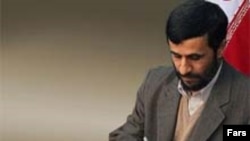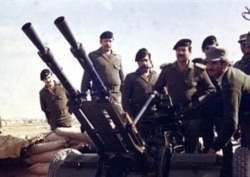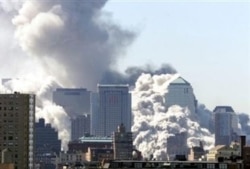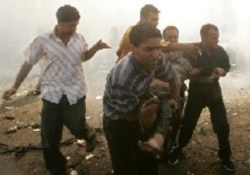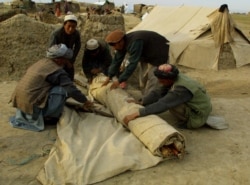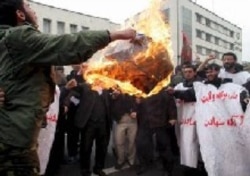Mr. George Bush,
President of the United States of America
For some time now I have been thinking, how one can justify the undeniable contradictions that exist in the international arena and which are being constantly debated, especially in political forums and among university students. Many questions remain unanswered. These have prompted me to discuss some of the contradictions and questions, in the hopes that it might bring about an opportunity to redress them.
Can one be a follower of Jesus Christ (peace be upon Him), the great Messenger of God, feel obliged to respect human rights, present liberalism as a civilization model, announce one's opposition to the proliferation of nuclear weapons and [other] weapons of mass destruction [WMD], make "War [on] Terror" his slogan, and, finally, work toward the establishment of a unified international community -- a community which Christ and the virtuous of the Earth will one day govern, but, at the same time, have countries attacked; have the lives, reputations, and possessions of people destroyed; and on the slight chance [that there are] criminals in a village, city, or convoy, for example, set ablaze the entire village, city, or convoy?
The War In Iraq
Or because of the possibility of the existence of WMDs in one country, it is occupied, around 100,000 people are killed, its water resources, agriculture, and industry destroyed, close to 180,000 foreign troops are put on the ground, the sanctity of private homes is violated, and the country pushed back perhaps 50 years. At what price? Hundreds of billions of dollars are spent from the treasury of one country and certain other countries; tens of thousands of young men and women -- as occupation troops -- are put in harm's way, taken away from their family and loved ones; their hands are stained with the blood of others; they are subjected to so much psychological pressure that every day some commit suicide and those returning home suffer depression, become sickly, and grapple with all sorts of aliments; and some are killed and their bodies handed to their families.
On the pretext of the existence of WMDs, this great tragedy came to engulf both the peoples of the occupied and the occupying country. Later it was revealed that no WMDs existed to begin with. Of course [former Iraqi President] Saddam [Hussein] was a murderous dictator. But the war was not waged to topple him. The announced goal of the war was to find and destroy weapons of mass destruction. He was toppled along the way toward another goal. Nevertheless, the people of the region are happy about it. I point out that throughout the many years of the war on Iran, Saddam was supported by the West.
Mr. President, you might know that I am a teacher. My students ask me how can theses actions be reconciled with the values outlined at the beginning of this letter, with one's duty to the tradition of Jesus Christ (PBUH), the Messenger of peace and forgiveness.
You are familiar with history. Aside from the Middle Ages, at what other point in history has scientific and technical progress been a crime? Can the possibility of scientific achievements being utilized for military purposes be reason enough to oppose science and technology altogether? If such a supposition is true, then all scientific disciplines, including physics, chemistry, mathematics, medicine, engineering, etc., must be opposed.
There are prisoners at Guantanamo Bay who have not been tried, have no legal representation. Their families cannot see them and they are obviously kept in a strange land outside their own country. There is no international monitoring of their conditions and fate. No one knows whether they are prisoners, prisoners of war, accused, or criminals.
European investigators have confirmed the existence of secret prisons in Europe too. I could not correlate the abductions of people and their detention in secret prisons with the provisions of any judicial system. For that matter, I fail to understand how such actions correspond to the values outlined in the beginning of this letter, i.e., the teachings of Jesus Christ (PBUH), human rights, and liberal values.
Israel And The Holocaust
Young people, university students, and ordinary people have many questions about the phenomenon of Israel. I am sure you are familiar with some of them.
Throughout history many countries have been occupied, but I think the establishment of a new country with a new people, is a new phenomenon that is exclusive to our times.
Students are saying that 60 years ago such a country did not exist. They show old documents and globes and say, "Try as we might, we have not been able to find a country named Israel." I tell them to study the history of World War I and World War II. One of my students told me that during World War II, in which many tens of millions of people perished, news about the war, was quickly disseminated by the warring parties. Each touted their victories and the most recent battlefront defeat of the other party.
After the war, they claimed that 6 million Jews had been killed. Six million people that were surely related to at least 2 million families. Again, let us assume that these events are true. Does that logically translate into the establishment of the state of Israel in the Middle East or support for such a state? How can this phenomenon be rationalized or explained?
Mr. President, I am sure you know how -- and at what cost -- Israel was established: Many thousands were killed in the process; millions of indigenous people were made refugees; hundred of thousands of hectares of farmland, olive plantations, towns, and villages were destroyed.
This tragedy is not exclusive to the time of establishment; unfortunately it has been ongoing for 60 years now. A regime has been established that does not show mercy even to children, that destroys houses while the occupants are still in them, that announces beforehand its list and plans to assassinate Palestinian figures and keeps thousands of Palestinians in prison. Such a phenomenon is unique -- or at the very least extremely rare -- in recent memory.
Another big question asked by people is, why is this regime being supported? Is support for this regime in line with the teachings of Jesus Christ (PBUH) or Moses (PBUH) or liberal values? Or are we to understand that allowing the original inhabitants of these lands -- inside and outside Palestine -- whether they are Christian, Muslim, or Jewish, to determine their own fate runs contrary to principles of democracy, human rights, and the teachings of the prophets? If not, why is there so much opposition to a referendum?
The Palestinian Election
The newly elected Palestinian administration recently took office. All independent observers have confirmed that this government represents the electorate. Unbelievingly, they have put the elected government under pressure and have advised it to recognize the Israeli regime, abandon the struggle and follow the programs of the previous government.
If the current Palestinian government had run on the above platform, would the Palestinian people have voted for it? Again, can such position taken in opposition to the Palestinian government be reconciled with the values outlined earlier? The people are also saying, "Why are all UN Security Council resolutions in condemnation of Israel vetoed?"
Mr. President, as you are well aware, I live among the people and am in constant contact with them. Many people from around the Middle East manage to contact me as well. They do not have faith in these dubious policies either. There is evidence that the people of the region are becoming increasingly angry with such policies.
It is not my intention to pose to many questions, but I need to refer to other points as well.
'Scientific Research And Development'
Why is it that any technological and scientific achievement reached in the Middle East regions is translated into and portrayed as a threat to the Zionist regime? Is not scientific research and development one of the basic rights of nations?
You are familiar with history. Aside from the Middle Ages, at what other point in history has scientific and technical progress been a crime? Can the possibility of scientific achievements being utilized for military purposes be reason enough to oppose science and technology altogether? If such a supposition is true, then all scientific disciplines, including physics, chemistry, mathematics, medicine, engineering, etc., must be opposed.
Lies were told in the Iraqi matter. What was the result? I have no doubt that telling lies is reprehensible in any culture, and you do not like to be lied to.
The Third World
Mr. President, don't Latin Americans have the right to ask why their elected governments are being opposed and coup leaders supported? Or, why must they constantly be threatened and live in fear?
The people of Africa are hardworking, creative, and talented. They can play an important and valuable role in providing for the needs of humanity and can contribute to its material and spiritual progress. Poverty and hardship in large parts of Africa are preventing this from happening. Don't they have the right to ask why their enormous wealth -- including minerals -- is being looted, despite the fact that they need it more than others?
Again, do such actions correspond to the teachings of Christ and the tenets of human rights?
The brave and faithful people of Iran too have many questions and grievances, including: the coup d'etat of 1953 and the subsequent toppling of the legal government of the day; opposition to the Islamic Revolution, transformation of an embassy into a headquarters supporting the activities of those opposing the Islamic republic (many thousands of pages of documents corroborates this claim); support for Saddam in the war waged against Iran; the [July 1988] shooting down of an Iranian passenger plane; the freezing of the assets of the Iranian nation; increasing threats, anger, and displeasure regarding the scientific and nuclear progress of the Iranian nation (just when all Iranians are jubilant and collaborating their country's progress); and many other grievances that I will not refer to in this letter.
September 11, 2001
Mr. President, September 11[, 2001,] was a horrendous incident. The killing of innocents is deplorable and appalling in any part of the world. Our government immediately declared its disgust with the perpetrators and offered its condolences to the bereaved and expressed its sympathies.
All governments have a duty to protect the lives, property, and good standing of their citizens. Reportedly, your government employs extensive security, protection, and intelligence systems -- and even hunts its opponents abroad. September 11 was not a simple operation. Could it be planned and executed without coordination with intelligence and security services -- or their extensive infiltration? Of course, this is just an educated guess. Why have the various aspects of the attacks been kept secret? Why are we not told who botched their responsibilities? And, why aren't those responsible and the guilty parties identified and put on trial?
All governments have a duty to provide security and peace of mind for their citizens. For some years now, the people of your country and neighbors in world trouble spots do not have peace of mind. After 9/11, instead of healing and tending to the emotional wounds of the survivors and the American people -- who had been immensely traumatized by the attacks -- some Western media only intensified the climate of fear and insecurity. Some constantly talked about the possibility of new terror attacks and kept the people in fear. Is that service to the American people? Is it possible to calculate the damages incurred from fear and panic?
American citizens lived in constant fear of fresh attacks that could come at any moment and at any place. They felt insecure in the streets, in their place of work, and at home. Who would be happy with this situation? Why was the media, instead of conveying a feeling of security and providing peace of mind, giving rise to feelings of insecurity?
The Role Of The Media
Some believe the hype paved the way -- and was the justification -- for an attack on Afghanistan. Again I need to refer to the role of media. In media charters, correct dissemination of information and honest reporting of a story are established tenets. I express my deep regret about the disregard shown by certain Western media for these principles. The main pretext for an attack on Iraq was the existence of WMDs. This was repeated incessantly -- for the public to, finally, believe -- and to set the ground for an attack on Iraq.
Will the truth not be lost in a contrived and deceptive climate? Again, if the truth is allowed to be lost, how can that be reconciled with the earlier-mentioned values? Is the truth known to the Almighty lost as well?
Mr. President, in countries around the world citizens provide for the expenses of governments so that their governments in turn are able to serve them. The question here is, "what has the hundreds of billions of dollars spent every year to pay for the Iraqi campaign produced for [U.S.] citizens?"
As Your Excellency is aware, in some states of your country, people are living in poverty. Many thousands are homeless and unemployment is a huge problem. Of course these problems exist -- to a greater or lesser extent -- in other countries as well. With these conditions in mind, can the gargantuan expenses of the [Iraq] campaign -- paid from the public treasury -- be explained and be consistent with the aforementioned principles?
What has been said [above] are some of the grievances of the people around the world, in our region, and in your country. But my main contention -- and I am hoping you will agree to some of it -- is: those in power have a specific time in office and do not rule indefinitely, but their names will be recorded in history and will be constantly judged in the immediate and distant futures.
What Legacy Will We Leave?
The people will scrutinize our presidencies. Did we manage to bring peace, security, and prosperity to our people or insecurity and unemployment? Did we intend to establish justice, or just support special-interest groups and -- by forcing many people to live in poverty and hardship -- make a few people rich and powerful, -- thus trading the approval of the people and the Almighty for [that of those few]? Did we defend the rights of the underprivileged or ignore them? Did we defend the rights of all people around the world or impose wars on them, interfere illegally in their affairs, and establish hellish prisons and incarcerate some of them? Did we bring the world peace and security or did we raise the specter of intimidation and threats? Did we tell the truth to our nation and others around the world or present an inverted version of it? Were we on the side of people or the occupiers and oppressors? Did our administration set out to promote rational behavior, logic, ethics, peace, fulfilling obligations, justice, service to the people, prosperity, progress, and respect for human dignity or, rather, the force of arms, intimidation, insecurity, disregard for the people, delaying the progress and excellence of other nations, and the disrespect of [other] people's rights? And finally, they will judge us on whether we remained true to our oath of office -- to serve the people, which is our main task, and the traditions of the prophets.
Mr. President, how much longer can the world tolerate this situation? Where will this trend lead the world? How long must the people of the world pay for the incorrect decisions of some rulers? How much longer will the specter of insecurity -- raised from the stockpiles of weapons of mass destruction -- haunt the people of the world? How much longer will the blood of the innocent men, women, and children be spilled on the streets and people's houses destroyed over their heads? Are you pleased with the current condition of the world? Do you think present policies can continue? If billions of dollars spent on security, military campaigns, and troop movement were instead spent on investment and assistance for poor countries, promotion of health, combating different diseases, education, the improvement of mental and physical fitness, assistance to the victims of natural disasters, creation of employment opportunities and production, development projects and poverty alleviation, establishment of peace, mediation between disputing states and extinguishing the flames of racial, ethnic, and other conflicts -- were would the world be today? Would not your government and people be justifiably proud? Would not your administration's political and economic standing have been stronger? And, I am most sorry to say, would there have been this ever-increasing global hatred of the American governments?
Mr. President, it is not my intention to distress anyone. If the prophets Abraham, Isaac, Jacob, Ishmael, Joseph, or Jesus Christ (PBUH) were with us today, how would they judge such behavior? Will we be given a role to play in the promised world, where justice will become universal and Jesus Christ (PBUH) will be present? Will they even accept us?
Monotheism
My basic question is this: Is there no better way to interact with the rest of the world?
Today there are hundreds of millions of Christians, hundreds of millions of Muslims, and millions of
people who follow the teachings of Moses (PBUH). All divine religions share and respect one word and that is "monotheism" or the belief in a single God and no other in the world.
The Holy Koran stresses this common word and calls on all followers of divine religions and says: "Say, O followers of the Book! Come to an equitable proposition between us and you that we shall not serve any but Allah and [that] we shall not associate aught with Him and [that] some of us shall not take others for lords besides Allah, but if they turn back, then say: 'Bear witness that we are Muslims.'"
Mr. President, according to the divine verses, we have all been called upon to worship one God and follow the teachings of the divine prophets -- "to worship a God which is above all powers in the world and can do all He pleases." "The Lord, which knows that which is hidden and visible, the past and the future, knows what goes on in the hearts of His servants and records their deeds." "The Lord who is the possessor of the heavens and the earth and all universe is in His court." "Planning for the universe is done by His hands, and gives His servants the glad tidings of mercy and forgiveness of sins." "He is the companion of the oppressed and the enemy of oppressors". "He is the compassionate, the merciful." "He is the recourse of the faithful and guides them toward the light from darkness." "He is witness to the actions of His servants." "He calls on servants to be faithful and do good deeds, and asks them to stay on the path of righteousness and remain steadfast." "He calls on servants to heed His prophets and He is a witness to their deeds." "A bad ending belongs only to those who have chosen the life of this world and disobey Him and oppress His servants." "A good and eternal paradise belongs to those servants who fear His majesty and do not follow their lascivious selves."
We believe a return to the teachings of the divine prophets is the only road leading to salvation. I have been told that Your Excellency follows the teachings of Jesus (PBUH) and believes in the divine promise of the rule of the righteous on Earth. We also believe that Jesus Christ (PBUH) was one of the great prophets of the Almighty. He has been repeatedly praised in the Koran. Jesus (PBUH) has been quoted in Koran as well: "And surely Allah is my Lord and your Lord, therefore serve Him; this is the right path, Marium."
Service and obedience to the Almighty is the credo of all divine messengers.
The God of all people in Europe, Asia, Africa, America, the Pacific, and the rest of the world is one. He is the Almighty who wants to guide and give dignity to all His servants. He has given greatness to humans.
We again read in the Holy Book: "The Almighty God sent His prophets with miracles and clear signs to guide the people and show them divine signs and purity them from sins and pollution. And He sent the Book and the balance so that the people [might] display justice and avoid the rebellious."
All of the above verses can be seen, one way or another, in the Bible as well.
Judgment Day
Divine prophets have promised that the day will come when all humans will congregate before the court of the Almighty so that their deeds might be examined. The good will be directed toward Heaven and evildoers will meet divine retribution. I trust both of us believe in such a day, but it will not be easy to calculate the actions of rulers, because we must be answerable to our nations and all others whose lives have been directly or indirectly affected by our actions.
Afghan refugees in November 2001, shortly after the beginning of the U.S.-led campaign to oust the Taliban regime (bymedia)
Mr. President, history tells us that repressive and cruel governments do not survive. God has entrusted the fate of man to them. The Almighty has not left the universe and humanity to their own devices. Many things have happened contrary to the wishes and plans of governments. These tell us that there is a higher power at work and all events are determined by Him.
Can one deny the signs of change in the world today? Is this situation of the world today comparable to that of 10 years ago? Changes happen fast and come at a furious pace. The people of the world are not happy with the status quo and pay little heed to the promises and comments of a number of influential world leaders. Many people around the world feel insecure and oppose the spread of insecurity and war and do not approve of or accept dubious policies. The people are protesting the increasing gap between the haves and the have-nots and the rich and poor countries. The people are disgusted with increasing corruption. The people of many countries are angry about the attacks on their cultural foundations and the disintegration of families. They are equally dismayed with the fading of care and compassion.
World Turning To Religion
The people of the world have no faith in international organizations because their rights are not advocated by these organizations. Liberalism and Western-style democracy have not been able to help realize the ideals of humanity. Today these two concepts have failed. Those with insight can already hear the sounds of the shattering and fall of the ideology and thoughts of the liberal democratic systems.
Iranians burn an Israeli flag during a protest in front of the German Embassy in Tehran on February 14 (epa)
Mr. President, whether we like it or not, the world is gravitating toward faith in the Almighty and justice and the will of God will prevail over all things.
Peace to him who follows the rightfully guided,
Mahmud Ahmadinejad
President of the Islamic Republic of Iran
What The Street Thinks
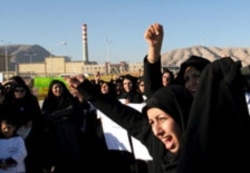 A demonstration in support of Iran's nuclear program outside the Isfahan uranium-conversion facility in Isfahan in January (epa)
A demonstration in support of Iran's nuclear program outside the Isfahan uranium-conversion facility in Isfahan in January (epa)
IRANIANS SPEAK OUT ON THE DISPUTE: To find out more about what Iranians think about the international controversy over their country's nuclear program, RADIO FARDA asked listeners to express their views....(more)
See also:
Iran: Public Has Mixed Feelings On Nuclear Issue

THE COMPLETE PICTURE: RFE/RL's complete coverage of controversy surrounding Iran's nuclear program.




